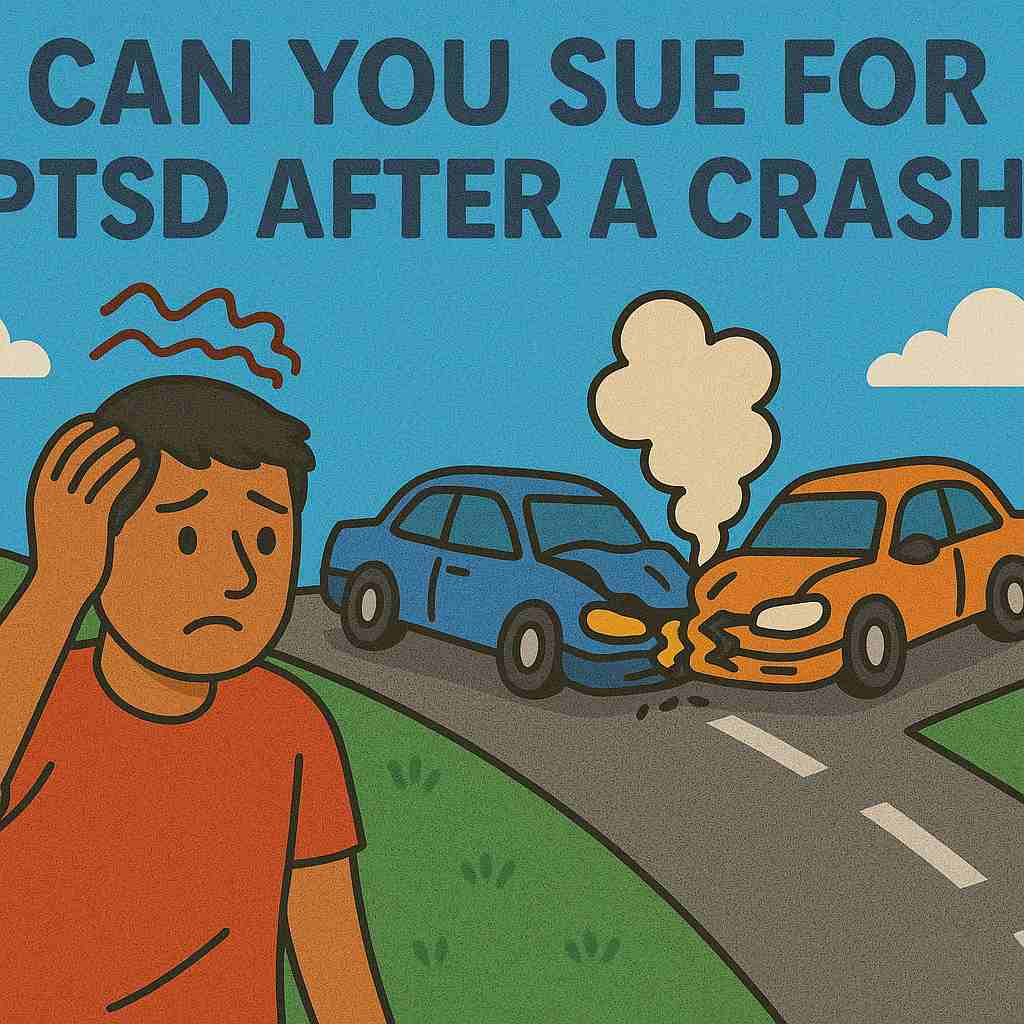Can You Sue for PTSD After a Crash?

Can You Sue for PTSD After a Crash? Understanding Your Rights and Options
Car crashes can leave lasting marks on your body—but they can also deeply affect your mind. One of the most serious psychological injuries people suffer after accidents is Post-Traumatic Stress Disorder (PTSD). While physical injuries often get the most attention, PTSD can be just as real, just as damaging, and just as deserving of compensation.
You might be asking: Can you sue for PTSD after a crash? The short answer is yes. But to understand how, when, and what you might recover, let’s explore this topic in detail.
What Is PTSD?
Post-Traumatic Stress Disorder is a mental health condition that can develop after experiencing or witnessing a traumatic event—like a serious car crash. Symptoms may include:
- Flashbacks: Reliving the accident in nightmares or intrusive memories.
- Avoidance: Steering clear of places, people, or activities that remind you of the crash.
- Emotional numbness: Feeling detached, losing interest in things you used to enjoy.
- Hypervigilance: Being easily startled or constantly on edge.
- Anxiety or depression: Persistent fear, worry, or sadness.
PTSD isn’t just “being shaken up.” It’s a recognized medical condition that can disrupt your work, relationships, and daily life.
Is PTSD After a Car Crash Common?
More common than many people think. Studies suggest that car accidents are a leading cause of PTSD among civilians. Even crashes that don’t cause severe physical injuries can leave survivors with ongoing mental health struggles.
Children, passengers, and witnesses are also at risk of developing PTSD after crashes.
Can You Legally Sue for PTSD?
Yes, you can. In a personal injury lawsuit, you can claim damages for emotional distress or mental anguish, including PTSD. California and many other states recognize psychological injuries as part of the damages you can recover.
To succeed, you usually need to show:
- The crash was caused by someone else’s negligence.
- You suffered PTSD or other emotional harm as a result.
- Your PTSD has been properly diagnosed and documented.
So while you can sue for PTSD, you’ll need evidence to support your claim.
What Kind of Evidence Do You Need?
Insurance companies and courts will want proof that your PTSD is real, serious, and tied to the crash. Common evidence includes:
- Medical records: Documentation from psychologists, psychiatrists, or therapists diagnosing PTSD.
- Therapy notes: Evidence of ongoing treatment, such as counseling or medication.
- Expert testimony: Mental health professionals explaining your diagnosis and prognosis.
- Personal accounts: Your own description of symptoms and how they impact daily life.
- Witness statements: Input from family or friends who’ve seen the changes in you.
Good documentation is critical. Simply saying “I feel anxious” usually isn’t enough. Professional medical support strengthens your case.
What Damages Can You Recover for PTSD?
If you prove your PTSD claim, you may be able to recover:
- Medical expenses: Costs for therapy, counseling, medications, and future care.
- Lost wages: Income lost if PTSD keeps you from working.
- Loss of earning capacity: Reduced ability to work in the future.
- Pain and suffering: Compensation for emotional distress, fear, anxiety, and reduced quality of life.
Emotional injuries like PTSD are often included in the “pain and suffering” part of a settlement or verdict, which can be significant depending on the severity.
What If I Didn’t Have Physical Injuries?
You don’t need to have broken bones or visible injuries to sue for PTSD. While physical injuries can make a PTSD claim stronger (by showing the crash was severe), courts understand that even minor crashes can traumatize people.
Your lawyer can help you show how the crash caused PTSD, even if you walked away physically unharmed.
Who Can Be Held Responsible for PTSD After a Crash?
Anyone whose negligence contributed to the crash can be held responsible for your PTSD. This includes:
- Another driver who caused the accident.
- A company that employed the driver if they were working at the time.
- Vehicle or parts manufacturers if a defect caused the crash.
- Government agencies responsible for unsafe road conditions.
Your lawyer will investigate who is at fault and ensure all responsible parties are included in your claim.
What If the Insurance Company Denies My PTSD Claim?
It’s not uncommon for insurance companies to push back on emotional distress claims. They might argue:
- PTSD is hard to prove.
- Your symptoms aren’t that serious.
- The PTSD was caused by something else.
This is why having medical records and an experienced lawyer is so important. A lawyer can negotiate with the insurance company, present strong evidence, and take your case to court if needed.
How Long Do You Have to Sue for PTSD After a Crash?
There’s a time limit for filing personal injury claims called the statute of limitations. In California, it’s generally two years from the date of the crash. If you miss this deadline, you may lose your right to sue.
There can be exceptions—like if the defendant is a government entity or if you were a minor at the time of the crash—so it’s important to talk to a lawyer quickly.
Do You Need a Lawyer to Sue for PTSD?
Technically, you can file a claim without a lawyer. But proving PTSD claims can be complicated. A lawyer can:
- Help gather medical evidence.
- Hire expert witnesses.
- Calculate all your damages, including future costs.
- Negotiate with insurance companies.
- File the lawsuit and go to trial if needed.
Because many injury lawyers work on a contingency fee, you don’t pay anything upfront—they only get paid if they win for you.
What Should You Do If You Think You Have PTSD After a Crash?
If you’re struggling after a crash, here’s what to do:
- Seek medical help. Talk to your doctor, therapist, or counselor. Get a proper diagnosis and start treatment.
- Document your symptoms. Write down how you feel, what triggers you, and how it affects your life.
- Save your records. Keep therapy notes, prescriptions, and bills.
- Talk to a lawyer. Get a free consultation to see if you have a case.
Yes, You Can Sue for PTSD After a Crash
PTSD is real. It can be devastating. And if someone else’s negligence caused it, you shouldn’t have to carry the burden alone. You have the right to seek compensation for your emotional injuries, just like for physical ones.
If you’re wondering about your options, don’t wait. Talk to a personal injury lawyer who understands PTSD claims. They can help you get the support, treatment, and compensation you need to start healing and move forward.









